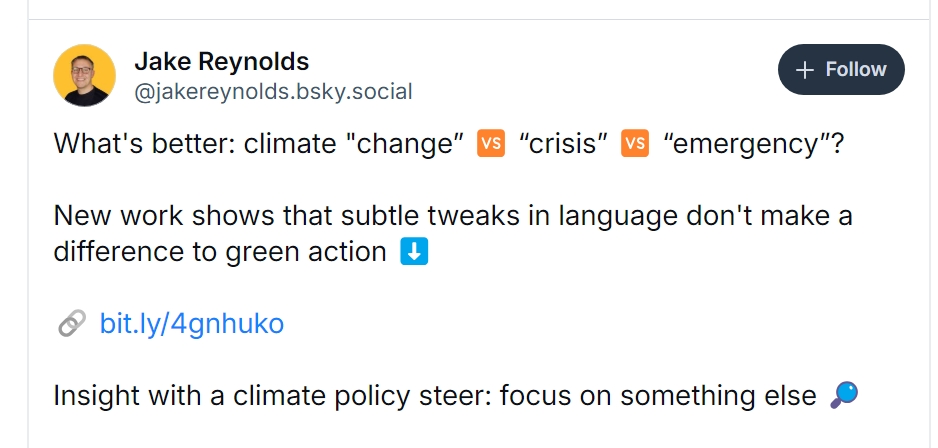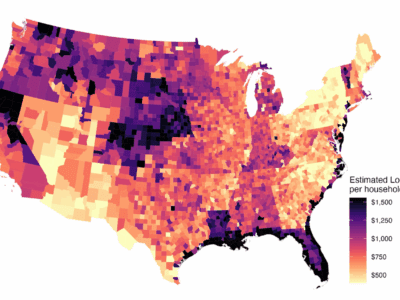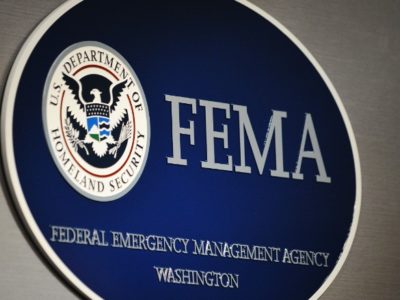A Crisis in Climate Communications
Deadly windstorms, wildfires, and hurricanes constitute something more horrific than just “climate change.”
What’s best for communicating urgency: phrases like “global warming” and “climate change” or “climate crisis” and “climate emergency”? What do audiences take away from these semantic choices? Does it matter what words we use? What about when the entire nation is watching a series of wildfires engulf Los Angeles, fueled by unusually dry vegetation during what used to be the wet season?
I’ve spent a lot of time thinking about these questions. And I do think it matters—now more than ever—even if it doesn’t explicitly inspire people to climate action. Not everyone agrees with me.
This question popped up recently thanks to a pair of journal articles based on psychology experiments testing people’s reactions to these different climate-related phrases. One in August 2024 asked, “Should we change the word we use for climate change?” Another in December 2024 concluded in its very article title, “Climate change terminology does not influence willingness to take climate action.” That article was also the subject of a thread on Bluesky last month that generated interesting discussion about methodology (including from some unrelated researchers, myself, and Genevieve Guenther who literally wrote the book on “The Language of Climate Politics.”)

“New work shows that subtle tweaks in language don’t make a difference to green action,” the thread starts. Just call it “climate change” and move on to more important things—that was the gist of the argument. But is it such a subtle, insignificant difference to label something a “crisis” as opposed to just change over time? Aren’t there moral, ethical, historical, and even legal reasons to choose our words more carefully?
Words matter because precision is important—at least in journalism, policy, and law. Back when I led a local newsroom, a few years ago now, I would routinely help craft guidelines for news writing on certain topics, including climate. Such guidelines were suggested terminology, editorial preferences, words to try to avoid, and tips for how to concisely capture complexity for broadcast or publishing. I recall advising that our reporters and producers employ the phrase “climate crisis” to communicate the immense stakes of the problem to the audience despite the slow nature of greenhouse gas emissions produced over several decades. We advised against “global warming” as outdated and less inclusive of other related climate phenomena than just extreme heat. This guideline did not bar any particular words, and it acknowledged that sometimes you need to use several different phrases in a given story. We regularly referred to “climate change” and “the climate crisis” depending on the context. We put thought into how to frame the topic of climate—not with the purpose of politically influencing people to take any particular climate action per se—but to be informative and accurate. We were hardly alone. Professional organizations like Covering Climate Now have sprung up to help journalists consistently make informed, quick connections between the burning of fossil fuels and the devastation of increasing disasters.
Newsrooms like mine also crafted guidelines for covering January 6 violence at the U.S. Capitol. “Protest”? “Riot”? “Mob”? “Insurrection”? It’s hard to imagine any researchers saying it doesn’t matter what you call that event, just because polling shows it failed to inspire political support for impeachment.
Words matter because they carry context and history. It was the GOP’s longtime message maestro Frank Luntz who first advised replacing “global warming” for the more mundane sounding “climate change” back in the early 2000s. A memo by Luntz described the environment as “the single issue on which Republicans in general – and President Bush in particular – are most vulnerable.” Following Luntz’s memo, then-President George W. Bush stopped using “global warming” in speeches, the Guardian reported at the time. There’s another rhetorical purpose to the notion of “climate change”: it’s not just passive and impartial sounding; it offers no hint as to who might be responsible. (For what it’s worth, Luntz has denounced his earlier climate denial work and spoken out about the need to solve the climate crisis. His more recent messaging advice is here.)
I think blame is an important part of messaging. Last fall, I returned to my alma mater Occidental College to speak to a communications class that focuses on climate issues. The class, “Rhetorical Fault lines: Persuasive Journalism, Public Relations and Propaganda” is taught by a journalism professor I studied with years ago, Bob Sipchen, formerly of the Los Angeles Times, Sierra Magazine, and the Sierra Club. I gave a short presentation to his students on some of the more important developments in climate communications. We talked about how journalists, activists, and politicians have framed the issue ever since the discovery of the “greenhouse effect.” We talked about whether hope or fear is a better motivator. And we talked about terminology. Bob has been a proponent of a different term: “climate disruption.” The case he makes is that no one wants to see their life, their neighborhood, their favorite foods disrupted. I like the phrase though I worry that plenty of Americans actually do want to see the status quo disrupted.
One week after I spoke at Bob’s class, voters chose a second Trump administration that will undoubtedly put oil and gas interests ahead of the health and safety of Americans. Words matter even more at this point in the climate movement, because we just had an election that saw the fossil fuel industry spend $219 million to elect the new government. Republicans are doubling down as the oil and gas party while many Democrats are rebranding their climate policies as affordability measures. Words matter because attention spans are short. And much of the nation is watching Los Angeles burn down this week, just like they watched hurricane season bury communities in North Carolina. When people are paying attention, it’s important to make the connections and “climate change” alone does not do that.
So back to those psychology articles that were effectively making that argument. The August 2024 study found that the terms “climate change” and “global warming” received the highest ratings of familiarity of all the phrases but concluded “our findings also suggest a need to temper the conclusion that climate terms matter.” The authors said this was for two reasons 1) “the effect of terms was less strong for willingness to support policies… than for expressed concern, and perceived urgency” (In other words, terminology had some noticeable effect on a person’s attitude, just not their willingness to act) and 2) “the effect of political ideology was stronger than the effect of terminology for expressed concern, perceived urgency, willingness to support policies…” (i.e. those identifying as Republicans reacted negatively to all the climate terms.) “Changing the terms we use is likely not the key solution for promoting climate action,” the article’s authors concluded.
No one I know thinks that a single word choice could solve a global climate crisis. That doesn’t mean word choice is irrelevant. I suggested last month we call it “earthflation” and I’m only half-joking. We need to talk about climate in ways that change attitudes even if it doesn’t appear to move individual “willingness to act” as measured in a social science experiment. And anyway, defining our experience is about more than a political strategy. No matter what terms we use today, and in the future, I’d much prefer to grapple with explaining what’s happening to us then just move on to other things.
Reader Comments
4 Replies to “A Crisis in Climate Communications”
Comments are closed.







“…Changing the terms we use is likely not the key solution for promoting climate action…”
I respectfully disagree with this statement. After introducing the term “climate fraud” we have since witnessed new and remarkable public interest in promoting key solutions to remedy fraudulent government actions that purport to “mitigate” climate change.
Words matter. Action speaks louder than words. Climate fraud is real and must be stopped.
Climate change is here have no doubt
Too much rain too much drought
Run in circles scream and shout
It’ll cook your brain and freeze your feet
Too much rain too much heat
Snow coming soon no relief in sight
Tornados and floods you better run for your life
Climate change is here better hide in fear.
They need more money or it gets severe
Hurricanes on the way they’re comin soon
You’re all going to die in the next typhoon
Too much rain too much drought
Run in circles scream and shout
–from the internet–
The hysterical, hyperbolic rhetoric of news media reporting on large fires amplifies societal fears, distorts public understanding of ecological realities, and distracts from much-needed rational public policy options. Responsible media should focus a portion of reporting on addressing what can be done to mitigate the risks of similarly serious adverse outcomes from future wildland/urban fires. News media reporting should include information on potential policies to make developments more ignition resistant, such as requirements for new construction siting, construction materials and design, landscape design and other means. Ever larger and more expensive fire departments will not be particularly effective at reducing losses.
Survival emergency
When the nature conservancy did a study in merced California I told them to not mention the word climate change as many conservative people in the Central Valley would be turned off
Some of us here are working with strongtowns and have a pin on their map, the only local conversation group in the Central Valley. There are at least 250 now in Canada and US